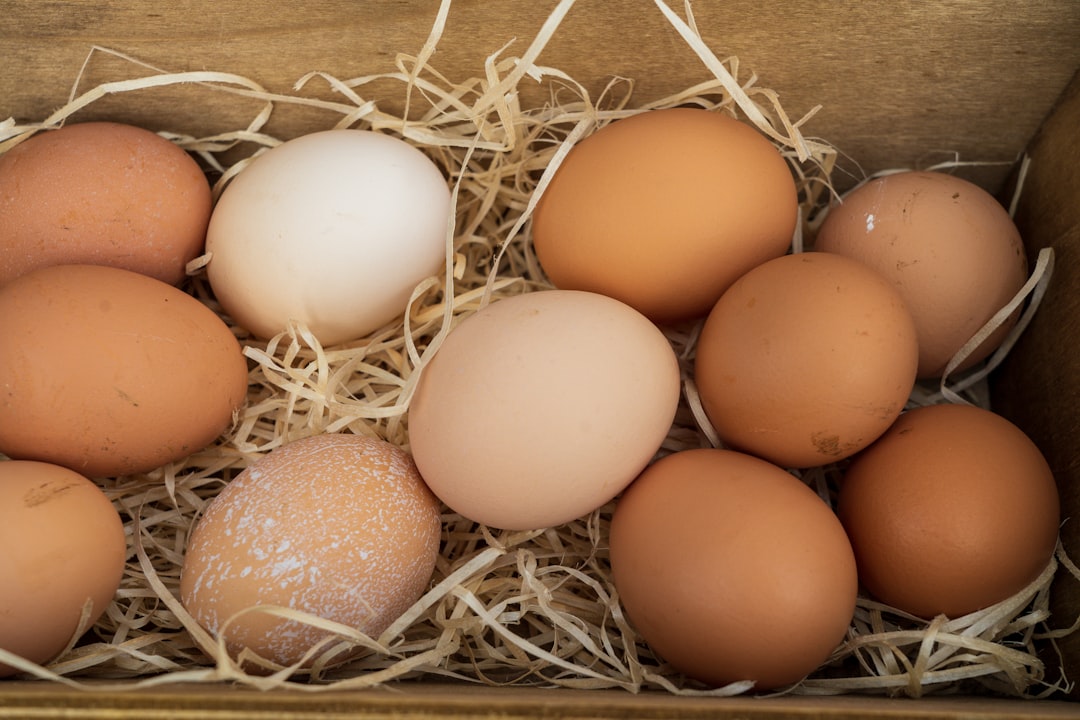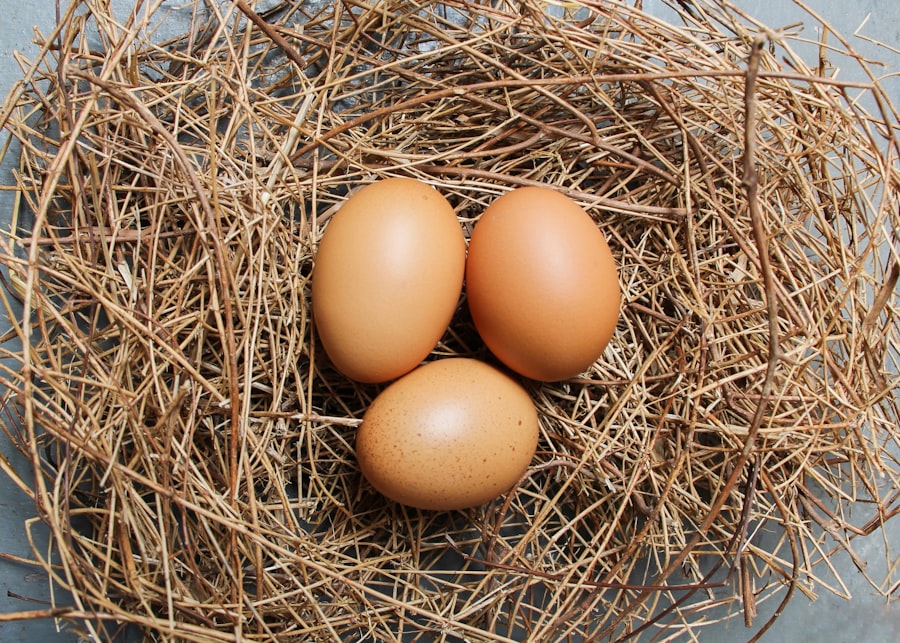Why Chickens Lay Eggs: The Science Behind It

Understanding the chicken’s reproductive system and egg production is crucial for several reasons. Firstly, it allows us to gain insight into the natural processes that occur within these animals, which can help us better care for them. Secondly, it enables us to optimize egg production, which is essential for commercial egg farms and backyard chicken keepers alike. By delving into the intricacies of the chicken’s reproductive system, we can uncover the factors that influence egg laying and implement strategies to maximize productivity.
Key Takeaways
- Chicken’s reproductive system consists of ovaries, oviducts, and a cloaca.
- Hormones like estrogen and progesterone play a crucial role in egg production.
- Light exposure affects the chicken’s circadian rhythm and stimulates egg laying.
- Proper nutrition with adequate protein, calcium, and vitamins is essential for egg production.
- Genetics also play a role in determining the number and quality of eggs a chicken can lay.
- Egg production declines with age, and stress can also impact egg laying negatively.
- Egg laying provides benefits like calcium and protein for the chicken’s health.
- Eggs are a rich source of protein, vitamins, and minerals for human consumption.
- Sustainable egg production involves ethical treatment of chickens and reducing environmental impact.
- Future advancements in technology and breeding can improve egg production and sustainability.
The anatomy of a chicken’s reproductive system
The female reproductive organs of a chicken consist of the ovary, oviduct, and cloaca. The ovary is responsible for producing the ova or eggs. Unlike mammals, chickens have only one functional ovary, located on the left side of their body. The oviduct is a long tube where the egg develops and receives various secretions necessary for its formation. Finally, the cloaca is the common opening through which eggs are laid and waste is expelled.
On the other hand, the male reproductive organs of a chicken include the testes and the phallus. The testes produce sperm cells, which are stored in a specialized structure called the seminal vesicle until mating occurs. During mating, the male transfers sperm to the female through his phallus, which is a small erectile organ located inside his cloaca.
The role of hormones in egg production
Hormones play a crucial role in regulating egg production in chickens. The two primary hormones involved are estrogen and progesterone. Estrogen stimulates the development of ovarian follicles and promotes egg yolk formation. Progesterone helps maintain the health of the oviduct and prepares it for egg laying.
The levels of these hormones can be influenced by various factors such as age, nutrition, and lighting conditions. For example, as a hen ages, her hormone levels may decline, leading to a decrease in egg production. Similarly, a lack of proper nutrition can disrupt hormone balance and negatively impact egg laying.
The effect of light on egg laying
| Light Intensity | Number of Eggs Laid | Percentage of Fertile Eggs |
|---|---|---|
| Low | 10 | 50% |
| Medium | 20 | 75% |
| High | 30 | 90% |
Light plays a significant role in the chicken’s reproductive system and egg production. Chickens are sensitive to the length of daylight, and changes in light exposure can trigger or inhibit egg laying. In nature, chickens typically lay more eggs during the longer days of spring and summer.
To maximize egg production, artificial lighting is often used in commercial egg farms. By providing additional hours of light, farmers can simulate longer days and encourage hens to lay more eggs. However, it is essential to strike a balance as excessive lighting can lead to stress and other health issues.
The importance of nutrition in egg laying
Proper nutrition is vital for optimal egg production in chickens. A balanced diet should include essential nutrients such as protein, carbohydrates, fats, vitamins, and minerals. Protein is particularly important as it provides the building blocks for egg formation.
Calcium is another crucial nutrient for egg production as it is required for the formation of the eggshell. A lack of calcium can result in thin or weak shells, making them more prone to breakage.
The genetics of egg laying

Genetics also play a significant role in egg production. Selective breeding has been used for centuries to improve various traits in chickens, including egg laying capacity. By selecting hens that consistently lay large numbers of eggs, breeders can pass on these desirable traits to future generations.
Modern breeding techniques have allowed for even more precise selection of genes related to egg production. This has led to the development of highly productive commercial laying breeds that can lay hundreds of eggs per year.
The relationship between age and egg production
Age has a significant impact on egg production in chickens. Hens typically start laying eggs around 5-6 months of age and reach peak production at around 1-2 years. After that, egg production gradually declines.
As hens age, their reproductive system undergoes changes that make it less efficient. The number and quality of eggs produced decrease, and the intervals between laying become longer. This decline in egg laying is a natural part of the aging process and cannot be reversed.
The impact of stress on egg laying
Stress can have a detrimental effect on egg production in chickens. Stressors such as overcrowding, extreme temperatures, predator threats, or sudden changes in the environment can disrupt the chicken’s hormonal balance and suppress egg laying.
To reduce stress and promote optimal egg production, it is essential to provide chickens with a calm and comfortable environment. This includes providing adequate space, proper ventilation, and protection from predators. Additionally, maintaining a consistent routine and minimizing sudden changes can help reduce stress levels.
The benefits of egg laying for the chicken
Egg laying is a natural process for chickens and serves several purposes. Firstly, it allows hens to reproduce and continue their species. Secondly, the act of laying eggs helps regulate hormone levels and maintain the health of the reproductive system. Lastly, egg laying can provide a sense of fulfillment and purpose for the chicken.
The benefits of eggs for humans
Eggs are not only beneficial for chickens but also for humans. They are a highly nutritious food source, containing high-quality protein, essential vitamins (such as vitamin B12 and vitamin D), minerals (such as iron and selenium), and healthy fats.
Incorporating eggs into a balanced diet can provide numerous health benefits. They can help support muscle growth and repair, improve brain function, promote eye health, and contribute to overall well-being.
The future of egg production and sustainability
The egg industry faces several challenges in terms of sustainability and ethical practices. As consumer demand for eggs continues to rise, there is a need to find more environmentally-friendly and ethical ways of producing eggs.
One approach is to transition to cage-free or free-range systems, where hens have more space and access to the outdoors. This allows for more natural behaviors and improves the welfare of the chickens. Additionally, implementing sustainable practices such as using renewable energy sources and reducing waste can help minimize the environmental impact of egg production.
Understanding the chicken’s reproductive system and egg production is essential for both the welfare of the chickens and the optimization of egg production. By delving into the anatomy, hormones, lighting, nutrition, genetics, age, stress, and benefits of egg laying, we can gain valuable insights into this natural process. Furthermore, recognizing the benefits of eggs for both chickens and humans allows us to appreciate their importance in our lives. As we move towards a more sustainable future, it is crucial to prioritize ethical and environmentally-friendly practices in egg production.
If you’re curious about why chickens lay eggs, you might find this article on Lawn World’s website quite interesting. It delves into the fascinating world of backyard chicken keeping and provides valuable insights into the reasons behind chickens’ egg-laying behavior. To learn more, check out their informative article here.
FAQs
What is the purpose of a chicken laying eggs?
The purpose of a chicken laying eggs is to reproduce and continue the species.
How often do chickens lay eggs?
Chickens typically lay one egg per day, but this can vary depending on the breed, age, and environmental factors.
What factors affect a chicken’s egg-laying ability?
Factors that can affect a chicken’s egg-laying ability include age, breed, nutrition, lighting, temperature, and stress.
Do all chickens lay eggs?
No, not all chickens lay eggs. Some breeds are raised for meat production and do not lay eggs, while others may have health issues that prevent them from laying.
Why do some chickens lay different colored eggs?
The color of a chicken’s egg is determined by the breed. Different breeds lay different colored eggs, ranging from white to brown to blue or green.
Can chickens lay eggs without a rooster?
Yes, chickens can lay eggs without a rooster. However, the eggs will not be fertilized and will not hatch into chicks.
How long does it take for a chicken to lay an egg?
It takes a chicken approximately 24-26 hours to lay an egg, from the time the egg is formed in the ovary to when it is laid.
What happens if a chicken doesn’t lay eggs?
If a chicken doesn’t lay eggs, it could be due to a variety of factors such as age, health issues, or stress. It is important to ensure that the chicken is receiving proper nutrition and care to encourage egg-laying.



